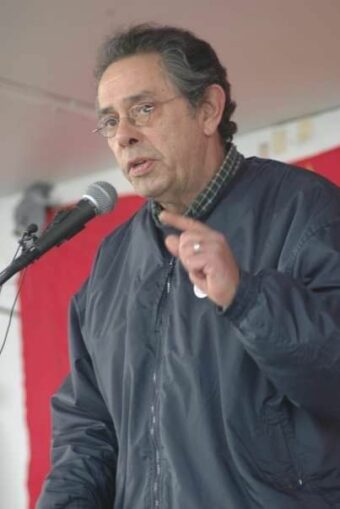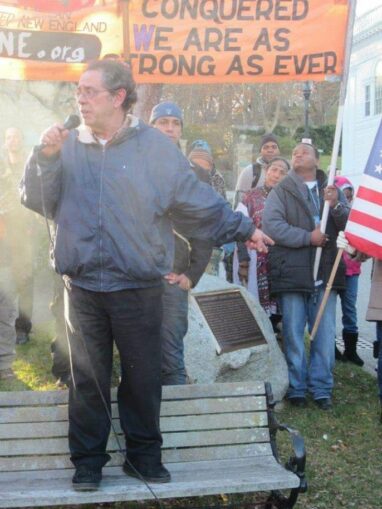In memory of Moonanum James:
‘We are not vanishing. We are not conquered’
Moonamum James, a co-leader of United American Indians of New England, died on Dec. 4, 2021 at the age of 70. In honor of his memory, WW reprints a talk he gave at the 49th Annual National Day of Mourning on Nov. 22, 2018, in Plymouth, Massachusetts.

Moonanum James. (WW Photo: K. James)
Once again on the fourth Thursday in November, United American Indians of New England and those who support us are gathered on Cole’s Hill to observe a National Day of Mourning. Today marks the 49th time we have come here — in all kinds of weather — to mourn our ancestors and speak the truth about our history.
Those who started National Day of Mourning could not have envisioned that generations would still be here, year after year, carrying on this tradition. Many of the elders who stood on this hill and organized the first Day of Mourning are no longer with us. But we feel their spirits guiding us today.
Forty-nine “Thanksgivings” ago, my father, an Aquinnah Wampanoag named Wamsutta Frank James, was invited to address a gathering celebrating the 350th anniversary of the arrival of the Pilgrims. When asked by the organizers to provide an advance copy of his speech, Wamsutta agreed. When they saw the speech, the planners told him he could only speak if he was willing to offer false praise of the Pilgrims. The organizers were even willing to write a speech for him. After all, they said, “[T]he theme of the celebration is brotherhood, and anything inflammatory would be out of place.”
My father refused to have words put into his mouth. Then, the National Day of Mourning came into being as a result of his refusal. Instead of speaking at the banquet, he and a group of Indigenous peoples and allies from throughout the Americas gathered on this hill and observed the first National Day of Mourning in 1970.
‘Thanksgiving’ = ‘thanks-taking’
What really happened at the first Thanksgiving — or what some of us call the first “thanks-taking”? According to popular myth, the Pilgrims, seeking religious freedom, landed on Plymouth Rock. The Indians welcomed them with open arms, then promptly faded into the background. Everyone lived happily ever after. The end.
Here is the truth. First, the Pilgrims are glorified and mythologized because the circumstances at Jamestown, the first colony in North America, were too ugly to hold up as an effective national myth. We can’t teach schoolchildren about cannibalism or have them dress up as starving people in class plays. Pilgrims and Indians are a much more marketable story.
Second, the Pilgrims came here as part of a commercial venture. They didn’t need religious freedom; they already had that in the Netherlands. The Mayflower Compact was merely a group of white men who wanted to ensure they would get a return on their investment.
When the Pilgrims arrived on outer Cape Cod — not on that pebble down the hill — one of the first things they did was to rob Wampanoag graves at Corn Hill and steal as much of their winter provisions of corn and beans as they were able to carry. The colonists’ own writings describe these actions.
The next part of the mythology is true: My Wampanoag ancestors welcomed the Pilgrims, not knowing that they and other Indigenous peoples would be dispossessed and killed by their guns and hanging ropes, as well as by their diseases. What did we get in return for this kindness? Genocide, the theft of our lands and never-ending repression.
The first official Thanksgiving did not take place in 1621 when the Wampanoag provided a harvesttime meal to the Pilgrims. Instead, it was officially proclaimed by Gov. John Winthrop of the Massachusetts Bay Colony in 1637 to celebrate the massacre of over 700 Pequot men, women and children on the banks of the Mystic River in Connecticut.
Holiday myth covers up genocide
Gov. Winthrop wrote of this event: “Those that escaped the fire were slain with the sword; some hewed to pieces, others run through with their rapiers . . . they thus destroyed about 400 at this time. It was a fearful sight to see them thus frying in the fire . . . horrible was the stink and scent thereof, but the victory seemed a sweet sacrifice, and they gave the prayers thereof to God, who had wrought so wonderfully for them . . . For the next 100 years, every Thanksgiving Day ordained by a Governor will be in honor of the bloody victory, thanking God that the battle had been won.” And yet the history books call us the “savages.”

Moonanum James addresses Day of Mourning in 2012. Credit: Steve Kirschbaum
Why does any of this matter? When people perpetuate the myth of Thanksgiving, they are not only erasing our genocide but also celebrating it. For my ancestors, the Pilgrims’ arrival marked the beginning of the end.
Those of us who managed to survive this genocide are treated as quaint relics of the past, forever relegated to this one point in history. But we did not simply fade into the background, as the Thanksgiving myth says. We have survived and thrived. We have persevered.
The very fact that you are here in Plymouth is proof that we did not vanish. The fact that other people — having seen through the Pilgrim myth — join us every year in the struggle to destroy that mythology is proof that we did not simply vanish. Our very presence frees this land from the lies of the history books and the mythmakers. We will remember and honor all our ancestors who went before us in the struggle. We will speak truth to power as we have been doing since the first Day of Mourning in 1970.
The first Day of Mourning was a powerful demonstration of Native unity. Today is a powerful demonstration of not only Indigenous unity, but the unity of all people who want to speak truth to power, who want the truth to be told and who want to see an end to the oppressive system brought to these shores by the Pilgrim invaders.
Sadly, the conditions which prevailed in Indian Country in 1970 still prevail today. Then we demanded an end to the Bureau of Indian Affairs. We still demand this today. Native nations should not need federal oversight to govern ourselves or take control of our own lands.
#StandwithMashpee
Recently, the Department of the Interior ruled that the Mashpee Wampanoag should not be able to take their own ancestral territory into trust. In other words, the Mashpee are threatened with having their very own land ripped away from them for a second time! This decision is an attack on the self-determination and sovereignty of all Native Nations throughout the country, especially those who were federally recognized after 1934.
I hope you will stand with the Mashpee and support pending legislation that would give Mashpee Wampanoag the right to petition for land to be taken into trust. Tell your congress members that this legislation should also be applied to other tribes in Massachusetts and elsewhere that were federally recognized after 1934.
Those who started National Day of Mourning also spoke of terrible racism and poverty. That continues. Some reservations, such as Navajo, do not even have clean drinking water for thousands of their people. Native youth suicide and school-dropout rates continue to be the highest in the nation.
However, Native peoples continue to display resilience in the face of ongoing settler-colonial oppression and work hard to ensure to take care of our communities and find solutions to problems that we face. We know that racism is alive and well, now more than ever.
All of us are struggling under the oppression of a capitalist system which forces people to make a bitter choice between heating and eating. We will continue to gather on this hill until the U.S. military and corporations stop polluting the earth and until we dismantle the brutal apparatus of mass incarceration. We will not stop until the oppression of our Two-Spirit siblings is a thing of the past.
The struggle will continue!
We won’t stop until the homeless have homes, until no person goes hungry or is left to die because they have little or no access to quality health care. Or until union busting is a thing of the past. We won’t stop until people from Mexico, Central and South America are no longer demonized and targeted by politicians in search of a scapegoat or until Palestinians reclaim the homeland and the autonomy that Israel has denied them for 70 years. Until then the struggle will continue.
We condemn all acts of violence and terrorism perpetrated by all governments and organizations against innocent people worldwide.
As we did in 1970, we mourn the loss of millions of our ancestors and the devastation of the land, water and air. Since the invasion of Columbus and the rest of the Europeans, Native people have been nonstop victims of terrorism. From the colonial period to the 21st century, this has entailed torture, massacres, systematic military occupations and the forced removals of Indigenous peoples from their ancestral homelands.
Let us not forget that this country was founded on the ideology of white supremacy, the widespread practice of enslavement of African peoples and the policies of genocide and land theft. Let us not forget that underneath the pipelines, skyscrapers, mines and oil rigs lie the interred bones, sacred objects and villages of our Native ancestors.
Today on liberated territory we will correct the history of a country that continues to glorify butchers such as Christopher Columbus, makes slave-owning presidents such as Washington and Jefferson into godlike figures, even carving their faces into the sacred Black Hills of the Lakota.
On our program today there will only be Indigenous speakers. This is one day when we speak for ourselves — without non-Native people, so-called “experts” — intervening to interpret and speak for us.
Our very presence frees this land from the lies of the history books, the profiteers and the mythmakers. We will remember and honor all our ancestors in struggle who went before us. We will speak truth to power. We will remember all our sisters and brothers, including Leonard Peltier and Mumia Abu-Jamal, who continue to be imprisoned.
In 1970 very few people would have thought that the Indigenous people of this hemisphere do not look upon the European invaders’ arrival as a reason to give thanks. Today thousands stand with us in spirit as we commemorate the 49th National Day of Mourning.
In the spirit of Crazy Horse, in the spirit of Metacom, in the spirit of Geronimo — and above all — to all people who fight and struggle for real justice, we say: We are not vanishing. We are not conquered. We are as strong as ever.

